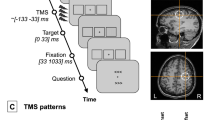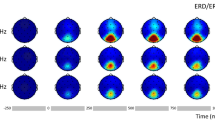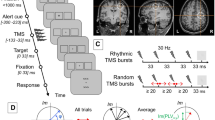Abstract
This study has attempted to increase the meaning and significance of findings in the experimental areas of electroencephalographic (EEG) visual or photic driving. The aim of this study was to investigate whether the visual stimulation at particular extremely low frequency order could possibly induce changes in the corresponding EEG frequency bands by examining the functional connectedness between brain regions. This was evaluated by applying the improved experimental protocol and objective using non-parametric spectral estimation coherence algorithm. The findings from our study revealed a significantly higher coherence in the EEG beta2 band (16.6 Hz) corresponding to 16.66 Hz visual stimulation, suggesting a high inter-hemispheric functional connectivity during visual stimulus. A significant increase was revealed during 50 Hz visual stimulation at gamma band and a decrease during 4 Hz visual stimulation at theta band, linked with a substantial transitional shift in predominance from anterior to posterior relative power. This study may also increase the awareness of EEG visual driving response studies in clinical practice to uncover potential neurophysiologic abnormalities.



Similar content being viewed by others
References
Achermann P, Borbely AA (1998) Coherence analysis of the human sleep electroencephalogram. Neuroscience 85(4):1195–1208. doi:10.1016/S0306-4522(97)00692-1
Adrian ED, Matthews BHC (1934) The Berger rhythm: potential changes from the occipital lobes in man. Brain 57:355–384. doi:10.1093/brain/57.4.355
Aftanas LI, Golocheikine SA (2001) Human anterior and frontal midline theta and lower alpha reflect emotional positive state and internalized attention: high-resolution EEG investigation of meditation. Neurosci Lett 310:57–60. doi:10.1016/S0304-3940(01)02094-8
American Clinical Neurophysiology Society (2006) Guideline 9B: guidelines on visual evoked potentials, pp 1–19
Basar E, Schurmann M (1994) Functional aspects of evoked alpha and theta responses in human and cats. Biol Cybern 72:175–183. doi:10.1007/BF00205981
Benesty J, Chen J, Huang Y (2005) A generalized MVDR spectrum. IEEE Signal Process Lett 12(12):827–830. doi:10.1109/LSP.2005.859517
Blum AS, Rutkove SB (2007) The clinical neurophysiology primer. Humana Press, New Jersey
Brauchli P, Michel CM, Zeier H (1995) Electrocortical, autonomic, and subjective responses to rhythmic audio-visual stimulation. Int J Psychophysiol 19:53–66. doi:10.1016/0167-8760(94)00074-O
Cantero JL, Atienza M, Salas RM, Gomez CM (1999) Alpha EEG coherence in different brain states: an electrophysiological index of the arousal level in human subjects. Neurosci Lett 271:167–170. doi:10.1016/S0304-3940(99)00565-0
Capon J (1969) High resolution frequency-wavenumber spectrum analysis. Proc IEEE 57(8):1408–1418. doi:10.1109/PROC.1969.7278
Choi C (1978) Photic EEG-driving responses in thalamotorized and medicated cases of Parkinson’s disease. Eur Arch Psychiatry Clin Neurosci 225(2):97–105
Coul B, Pedley T (1978) Intermittent photic stimulation: clinical usefulness on non-convulsive responses. Electroencephalogr Clin Neurophysiol 44:343–363
Cvetkovic D (2005) Electromagnetic and audio-visual stimulation of the human brain at extremely low frequencies, Ph.D. Thesis. RMIT University, School of Electrical and Computer Engineering, Melbourne, Australia
Cvetkovic D, Cosic I (2007) Inter and intra-hemispheric EEG coherence responses to visual stimulations. In: Proceedings of the 29th IEEE EMBs annual international conference, Lyon, France, pp 2839–2842
Cvetkovic D, Simpson D, Cosic I (2006) Influence of sinusoidally modulated visual stimuli at extremely low frequency range on the human EEG activity. In: Proceedings of the 28th IEEE EMBS annual international conference, New York City, USA, pp 1311–1314
Dawson B, Trapp RG (2001) Basic and clinical biostatistics, 3rd edn. Lange Medical Books/McGraw-Hill International Ltd., Singapore, p 399
Erol B (1999) Brain function and oscillations. II. Integrative brain function. Neurophysiology and cognitive processes. Springer, Berlin, pp 129–142
French CC, Beaumont G (1984) A critical review of EEG coherence studies of hemispheric function. Int J Psychophysiol 1:241–254. doi:10.1016/0167-8760(84)90044-8
Jin Y, Castellanos A Jr, Solis ER Jr, Potkin SG (2000) EEG Resonant responses in schizophrenia: a photic driving study with improved harmonic resolution. Schizophr Res 44:213–220. doi:10.1016/S0920-9964(99)00211-X
Jin S-H, Jeong J, Jeong D-G, Kim D-J, Kim SY (2002) Nonlinear dynamics of the EEG separated by independent component analysis after sound and light stimulation. Biol Cybern 86:295–401. doi:10.1007/s00422-001-0304-z
Kawaguchi T, Jijiwa H, Watanabe S (1993) The dynamics of phase relationships of alpha waves during photic driving. Electroencephalogr Clin Neurophysiol 87:88–96. doi:10.1016/0013-4694(93)90115-C
Kikuchi M, Wada Y, Koshino Y, Nanbu Y, Hashimoto T (2000) Effect of normal aging upon inter-hemispheric EEG coherence: analysis during rest and photic stimulation. Clin Electroencephalogr 31(4):170–174
Kikuchi M, Wada Y, Takeda T, Oe H, Hashimoto T, Koshino Y (2002) EEG harmonic responses to photic stimulation in normal aging and Alzheimer’s disease: Differences in inter-hemispheric coherence. Clin Neurophysiol 113(7):1045–1051. doi:10.1016/S1388-2457(02)00129-3
Krishnan G, Vohs J, Hetrick W, Carroll C, Shekhar A, Bockbrader M, O’Donnell B (2005) Steady state visual evoked potential abnormalities in schizophrenia. Clin Neurophysiol 116(3):614–624. doi:10.1016/j.clinph.2004.09.016
Lane JD, Kasian SJ, Owens JE, Marsh GR (1998) Binaural auditory beats affect vigilance performance and mood. Physiol Behav 63(2):249–252. doi:10.1016/S0031-9384(97)00436-8
Miranda de Sa MFL, Infantosi AFC (2005) Evaluating the entrainment of the alpha rhythm during stroboscopic flash stimulation by means of coherence analysis. Med Eng Phys 27:167–173. doi:10.1016/j.medengphy.2004.09.011
Miranda de Sa AMFL, Infantosi AFC (2007) Evaluating the relationship of non-phase locked activities in the electroencephalogram during intermittent stimulation: a partial coherence-based approach. Med Biol Eng Comput 45:635–642. doi:10.1007/s11517-007-0191-0
Newmark ME, Penry JK (1979) Photosensitivity and epilepsy: a review. Raven Press, New York
Pereda E, Quiroga RQ, Bhattacharya J (2005) Nonlinear multivariate analysis of neurophysiological signals. Prog Neurobiol 77:1–37. doi:10.1016/j.pneurobio.2005.10.003
Rappelsberger P (2005) The reference problem and mapping of coherence: a simulation study. Brain Topogr 2(1–2):63–72. doi:10.1007/BF01128844
Rosenfeld JP, Reinhart AM, Srivastava S (1997) The effects of alpha (10-Hz) and beta (22-Hz) “entrainment” stimulation on the alpha and beta EEG bands: Individual differences are critical to prediction of effects. Appl Psychophysiol Biofeedback 22(1):3–22. doi:10.1023/A:1026233624772
Scheuler W (1983) Clinical significance of increased reaction to photostimulation in the alpha frequency range. EEG EMG Z Elektroenzephalogr Elektromyogr Verwandte Geb 14:143–153 in German
Schurmann M, Basar E (2001) Functional aspects of alpha oscillations in the EEG. Int J Psychophysiol 39:151–158. doi:10.1016/S0167-8760(00)00138-0
Shaw JC (1981) An introduction to the coherence function and its use in EEG signal analysis. J Med Eng Technol 5(6):279–288. doi:10.3109/03091908109009362
Simpson DG (1998) Instrumentation for high spatial resolution steady state visual evoked potentials, Masters Thesis, Brain Sciences Institute and Biophysical Sciences and Electrical Engineering, Swinburne University of Technology, Melbourne, Australia
Stoica P, Moses RL (1997) Introduction to spectral analysis. Prentice-Hall, Upper Saddle River
Takasaka Y, Takamatsu K, Nakagawara M (1989) Anterior-posterior relationships of EEG in photosensitive subjects: coherence and cross-phase-spectral analysis. Jpn J Psychiatry Neurol 43(4):651–663. doi:10.1111/j.1440-1819.1989.tb03101.x
Tanaka H, Hayashi M, Hori AT (1999) Topographic mapping of EEG spectral power and coherence in delta activity during the transition from wakefulness to sleep. Psychiatry Clin Neurosci 53:155–157. doi:10.1046/j.1440-1819.1999.00509.x
Teplan M, Krakovska A, Stolz S (2006) EEG responses to long-term audio-visual stimulation. Int J Psychophysiol 59:81–90. doi:10.1016/j.ijpsycho.2005.02.005
Thuraisingham RA, Tran Y, Boord P, Craig A (2007) Analysis of eyes open, eye closed EEG signals using second-order difference plot. Med Biol Eng Comput 45:1243–1249. doi:10.1007/s11517-007-0268-9
Timmermann DAL, Lubar JF, Rasey HW, Frederick JA (1999) Effects of 20-min audio-visual stimulation (AVS) at dominant alpha frequency and twice dominant alpha frequency on the cortical EEG. Int J Psychophysiol 32:55–61. doi:10.1016/S0167-8760(98)00064-6
Toman J (1941) Flicker potentials and the alpha rhythm in man. J Neurophysiol 4:51–61
Townsend RE, Lubin A, Naitoh P (1975) Stabilisation of alpha frequency by sinusoidally modulated light. Electroencephalogr Clin Neurophysiol 39(5):515–518. doi:10.1016/0013-4694(75)90053-X
Vaisanen J, Malmivuo J, Hyttinen J (2008) Correlation between signal-to-noise ratios and region of interest sensitivity ratios of bipolar EEG measurements. Med Biol Eng Comput 46:381–389. doi:10.1007/s11517-008-0321-3
Vaisanen J, Vaisanen O, Malmivuo J, Hyttinen J (2008) New method for analyzing sensitivity distributions of electroencephalography measurements. Med Biol Eng Comput 46:101–108. doi:10.1007/s11517-007-0303-x
Wada Y, Nanbu Y, Kadoshima R, Jiang Z-Y, Koshino Y, Hashimoto T (1996) Interhemispheric EEG coherence during photic stimulation: sex differences in normal young adults. Int J Psychophysiol 22:45–51. doi:10.1016/0167-8760(96)00011-6
Walter VJ, Walter WG (1949) The central effects of rhythmic sensory stimulation. Electroencephalogr Clin Neurophysiol 1:57–86
Acknowledgments
This study is supported by Australian Research Council grant LP0562562. The authors would like to thank the anonymous reviewers for their helpful suggestions and review. The authors also gratefully acknowledge Brain Science Institute, Swinburne University, for lending the visual stimulator device to conduct the study.
Author information
Authors and Affiliations
Corresponding author
Rights and permissions
About this article
Cite this article
Cvetkovic, D., Cosic, I. EEG inter/intra-hemispheric coherence and asymmetric responses to visual stimulations. Med Biol Eng Comput 47, 1023–1034 (2009). https://doi.org/10.1007/s11517-009-0499-z
Received:
Accepted:
Published:
Issue Date:
DOI: https://doi.org/10.1007/s11517-009-0499-z




